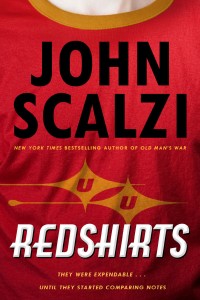J I M T R A S H
 Let’s have a look at the Hugo Awards
Let’s have a look at the Hugo Awards
 The winner of the Hugo for the best novel of 2012 was Redshirts by John Scalzi. This is a very entertaining novel. I breezed through it happily, enjoying the playfulness and joy. It dished out a significant number of chuckles, chortles and raised eyebrow moments. However, I wonder whether it is a worthy winner of the Hugo award. If I were to put it in a little box and shove a label on it then I would call Redshirts fan fiction. The plotline involves people in red shirts getting killed in all sorts of pointless and ridiculous ways. The ones that survive for any length of time are not exactly thrilled about the cards being dealt to them on this ship of danger and misfortune and try to alter their lives for the better. The novel is, of course, poking fun at TV science fiction shows, with Star Trek being the primary target for Scalzi’s humour photon torpedos. It’s fun and playful and yet it feels more like a fanzine piece or a blog. It is necessarily derivative although takes that and does some really inventive stuff with it to try and reconcile the ridiculous twisted physics of a TV drama. As you can see, I enjoyed the story but wonder whether it’s a Hugo winning novel. Let’s pull up a list of Hugo winners and see how it compares.
The winner of the Hugo for the best novel of 2012 was Redshirts by John Scalzi. This is a very entertaining novel. I breezed through it happily, enjoying the playfulness and joy. It dished out a significant number of chuckles, chortles and raised eyebrow moments. However, I wonder whether it is a worthy winner of the Hugo award. If I were to put it in a little box and shove a label on it then I would call Redshirts fan fiction. The plotline involves people in red shirts getting killed in all sorts of pointless and ridiculous ways. The ones that survive for any length of time are not exactly thrilled about the cards being dealt to them on this ship of danger and misfortune and try to alter their lives for the better. The novel is, of course, poking fun at TV science fiction shows, with Star Trek being the primary target for Scalzi’s humour photon torpedos. It’s fun and playful and yet it feels more like a fanzine piece or a blog. It is necessarily derivative although takes that and does some really inventive stuff with it to try and reconcile the ridiculous twisted physics of a TV drama. As you can see, I enjoyed the story but wonder whether it’s a Hugo winning novel. Let’s pull up a list of Hugo winners and see how it compares.
1961 – A Canticle for Leibowitz – Walter John Miller
This was and still is one of the most powerful books I’ve ever read. It left me with the feeling that faith can be stubborn and stupid but is a massively powerful force that can be of great benefit to mankind.
1962 – A Stranger in a Strange Land – Robert Heinlein
A twisty turny book that took a long hard look at relating to cultures alien to one’s own and the effect that different cultures can have upon those with which they come into contact.
1963 – The Man in the High Castle – Philip K Dick
An alternate history novel showing us how the United States might look and feel had the Axis powers prevailed in the Second World War. It’s a book that feels very vivid and powerfully real.
All 3 of these books have made an impression upon me that has lasted many years. They have become part of who I am and will continue to help flesh out my worldview. Redshirts gave me a good laugh and I am thoroughly grateful for that. However, I reckon it unlikely to become a significant part of my mental make up and I don’t feel it is a worthy Hugo winner.
Could the success of novels such as Redshirts in the Hugo awards be a popularity thing?
The Hugo voting system is an interesting little beastie. You need to be a member of Worldcon to vote. That immediately makes the community a very particular one indeed. These are people that are involved in the science fiction community and are quite seriously thinking of travelling what may be very large distances to attend a 6 day convention. They are also likely to be people who talk to other science fiction fans throughout the year on the internet. This creates a special attachment between large groups of people and makes it very easy to champion creatives who have sprung from your own fan group. The local boy/girl makes good, kind of excitement, can rapidly rumble around all the fan groups and have a significant effect upon voting in the Hugo Awards. The speed and excitement of all this can lead to less considered judgements on the quality of the novel you’re voting for. Your desire to give a boost to the career of someone you consider a friend can be greater than your desire to carefully judge the very finest book of the year.
But – and this is a huge but. Are there other books that were published last year that are of the calibre of The Man in the High Castle etc? Do we have books being published now that are as worthy of such high accolades?
Was Redshirts actually the best novel of 2012